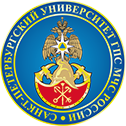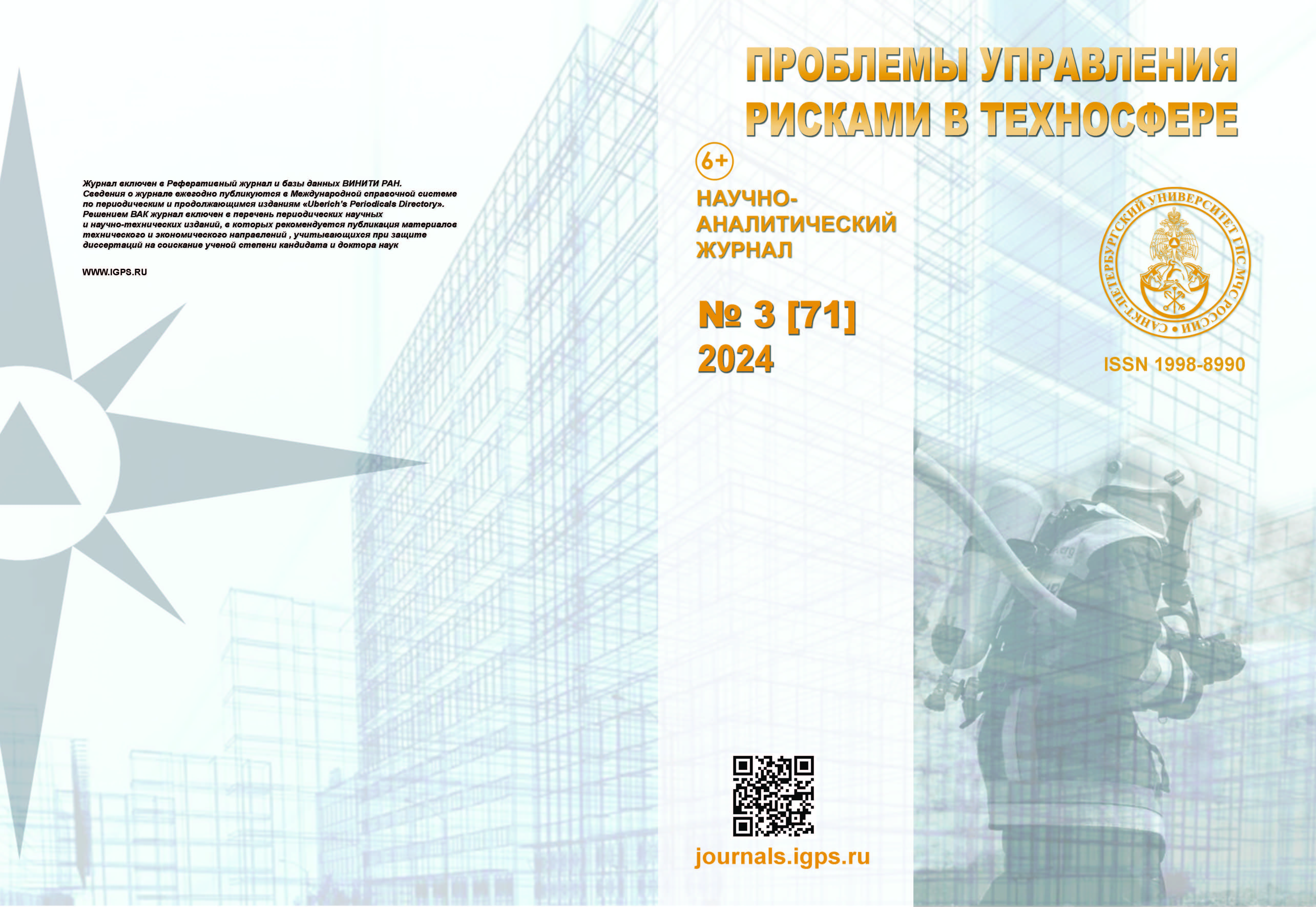Russian Federation
Russian Federation
Russian Federation
The greatest influence on the destructive potential of natural disasters is the weather, which is changing due to global warming. Therefore, the presentation of operational forecasts of various lead times, indicating the probable risks of incidents (emergency situations) is one of the main tasks of modern crisis management centers of territorial bodies of the constituent entities of the Russian Federation. In this regard, the authors of the work determined the goal of the study – the development of a predictive risk management model using the most powerful technological tool of artificial neural networks. To achieve this goal, a mathematical algorithm for the operation of neural networks with backpropagation of errors was proposed, implemented by a special software product. Using a prepared training sample of meteorological observations, we simulated the work of artificial neural networks to predict dangerous weather phenomena and the likelihood of heavy rains. Analysis of the results obtained made it possible to establish the permissible value of relative and absolute error.
orecasting, management, risks, floods, hazardous phenomena
1. Organizaciya deyatel'nosti podrazdelenij monitoringa i prognozirovaniya chrezvychajnyh situacij territorial'nyh organov MCHS Rossii: metod. Rekomendacii ot 25 dek. 2020 g. № 2-4-71-35-11. M.: MCHS Rossii, 2020. 9 s.
2. Prichiny i posledstviya izmeneniya klimata. URL: https://www.un.org/ru/climatechange/science/causes-effects-climate-change (data obrashcheniya: 19.05.2024.).
3. Posledstviya izmenenij klimata dlya ekonomicheskogo rosta i razvitiya otdel'nyh sektorov ekonomiki rossijskoj Arktiki / S.A. Voronina [i dr.] // Arktika: ekologiya i ekonomika. 2017. № 4 (28). S. 4–17. DOI:https://doi.org/10.25283/2223-4594-2017-4-4-17.
4. Pyat' sposobov vozdejstviya izmeneniya klimata na bezopasnost' cheloveka. URL: https:// www.un.org/ru/climatechange/science/climate-issues/human-security (data obrashcheniya: 19.05.2024).
5. Dubaj zatopilo posle sil'nyh dozhdej. URL: https://rg.ru/2024/04/16/dubaj-zatopilo-posle-silnyh-dozhdej.html (data obrashcheniya: 19.05.2024).
6. Leonov V., Gurov A. «Greenhouse» effect. Fiction or result of the prolonged action of the technogenic systems? // The Scientific Heritage. 2021. № 60-1 (60). S. 29–39.
7. Energetika, demografiya, klimat – est' li al'ternativa otkazu ot iskopaemogo organicheskogo topliva? / V.V. Klimenko [i dr.] // Doklady Rossijskoj akademii nauk. Fizika, tekhnicheskie nauki. 2022. T. 506. № 2. S. 66–72.
8. Medvedev S.S., Rahimova N.N. Harakteristika chrezvychajnyh situacij prirodnogo i tekhnogennogo haraktera Orenburgskoj oblasti // Regional'nye problemy geologii, geografii, tekhnosfernoj i ekologicheskoj bezopasnosti: sb. materialov V Vseros. nauch.-prakt. konf. Orenburg, 2023. S. 160–164.
9. Nesterenko Yu.M., Solomatin N.V. Rezhim stoka reki Ural i ego vliyanie na socium i prirodu // Byulleten' Orenburgskogo nauchnogo centra UrO RAN. 2023. № 1. S. 1–21.
10. Chemu nas uchit prirodnaya katastrofa v Orenburgskoj oblasti. URL: https://rg.ru/2024/04/09/reg-pfo/do-i-posle-potopa.html (data obrashcheniya: 19.05.2024).
11. Cyberattack detection in vehicles using characteristic functions, artificial neural networks, and visual analysis / Yu. Chevalier [et al.] // Informatics and Automation. 2021. Vol. 20. № 4. S. 845–868.
12. Tihomirov E.E. Klyuchevye ponyatiya nejronnyh setej // Nauchno-issledovatel'skij centr «Science Discovery». 2023. № 12. S. 143–149.
13. Kovalev M. Model for the representation of arti cial neural networks and actions for their processing in the knowledge base // Otkrytye semanticheskie tekhnologii proektirovaniya intellektual'nyh sistem. 2021. № 5. S. 93–100.
14. Korolev D.S., Kalach A.V. Prognozirovanie, osnovannoe na molekulyarnyh deskriptorah i iskusstvennyh nejronnyh setyah, kak sposob isklyucheniya obrazovaniya goryuchej sredy // Pozhary i chrezvychajnye situacii: predotvrashchenie, likvidaciya. 2016. № 2. S. 68–72.
15. Mathematical intellectual algorithm for determining the fire hazard parameters of oil and oil refining products / D.S. Korolev [et al.] // AIP Conference Proceedings. Melville, New York, United States of America, 2021. S. 70028.
16. Korolev D.S., Kalach A.V. Sravnitel'nyj analiz tradicionnoj i aktivnoj molniezashchity // Vestnik Voronezhskogo instituta GPS MCHS Rossii. 2015. № 3 (16). S. 12–15.
17. Svidetel'stvo o gosudarstvennoj registracii programmy dlya EVM № 2024615854 «Programma dlya analiza dannyh informacionnyh potokov s posleduyushchej analiticheskoj i prognoznoj obrabotkoj» / Korolev D.S., Vytovtov A.V., Kuprienko P.S., Sushko E.A., Fedyanin V.I., Koshel' A.N., Il'ina N.V. (RF); pravoobladatel' FGBOU VO Voronezhskij gosudarstvennyj tekhnicheskij universitet (FGBOU VO VGTU); zayavl. 05.03.2024 № 2024614716, gosudarstvennaya registraciya v reestre 13.03.2024.
18. Chizhikov N.R. Zadachi identifikacii dinamicheskih sistem na osnove nejronnyh setej // Vestnik Morskogo gosudarstvennogo universiteta. 2015. № 68. S. 94–98.
19. Budko N.A., Budko R.Yu., Budko A.Yu. Primenenie INS v interfejsah chelovek – mashina // Modelirovanie, optimizaciya i informacionnye tekhnologii. 2019. T. 7. № 1 (24). S. 328–340.






